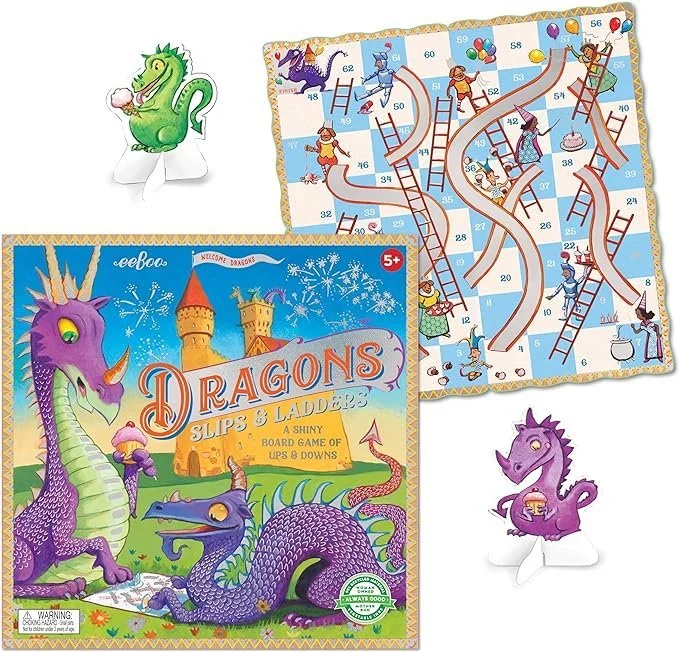Play Therapy: Cooperative Play
Our favorite toys and games that encourage collective effort
Cooperative play is a form of play that requires working together towards a common goal. It often involves teamwork, communication, and problem-solving skills. This type of play encourages collaboration and helps kids develop social skills as they learn to negotiate roles, share ideas, and support one another through collective effort.
In play therapy, the act of working together in a safe environment allows children to develop a sense of belonging and confidence, which can enhance emotional resilience and overall well-being.
Magnetic Fishing Game
This fishing game helps kids practice hand-eye coordination and number/color recognition while introducing them to simple rules and directives.
Use the colors on the spinner to talk about Color-Coded Feelings or adhere Conversation Prompts to the fish and answer them as you catch them!
Find this resource and other recommend toys and games for play therapy HERE.
Mancala
Mancala is a peaceful game of strategy that helps kids with prediction and addition skills. Since this game tends to be played quietly, consider putting on soft music and encouraging mindfulness while playing.
Find this resource and other recommend toys and games for play therapy HERE.
Tumbling Tower
A tumble tower is a great hands-on game to break the ice. This game requires competitive teamwork to get the tower as high as possible.
Write your own questions on the blocks, or print and adhere our Question Tabs and answer them as you play!
Find this resource and other recommend toys and games for play therapy HERE.
Matching Game
This emotions matching game uses colorful cards to help kids identify and understand a range of feelings in a playful context. Matching facial expressions to corresponding feelings enhances emotional intelligence, fosters self-awareness, and promotes communication skills.
Contextualize feelings by asking introspective questions: You made a match! How do you think that face is feeling? Can you tell me about a time you felt like that?
Find this resource and other recommend toys and games for play therapy HERE.
Slips and Ladders
This game of chance is a great way for kids to experience the ups and downs of game-play. It also helps them with counting and number recognition.
Use the “slips” to talk about coping skills! As you slide down, name something that helps you feel better when you’re down.
Find this resource and other recommend toys and games for play therapy HERE.
The Sneaky, Snacky Squirrel
With an element of imaginative play, this game encourages color recognition and hand-eye coordination.
Use the colors on the spinner to practice mindfulness through the senses. When you spin a color, talk about the corresponding sense: Yellow: What is something you can see? Purple: What is something you can hear? Red: What is something you can smell? Blue: What is something you can touch? Green: What is something you can taste?
Find this resource and other recommend toys and games for play therapy HERE.
String Game
String games require light-hearted collaboration that builds self-esteem and confidence. Through the experience of rewarded effort and mastery, kids learn to trust in their abilities and develop a more positive self-image.
Find this resource and other recommend toys and games for play therapy HERE.
Taco Cat Goat Cheese Pizza
This is a fast-paced, easy-to-learn card game that disarms tension and helps a child feel at ease in a therapeutic setting.
While counseling can be hard work, it should also have elements of levity. Games can help establish trust and rapport between the therapist and the child to allow for meaningful therapeutic work to bloom.
Find this resource and other recommend toys and games for play therapy HERE.
Puzzle
Puzzles help kids develop problem-solving skills, patience, and persistence, which can translate into valuable coping strategies. Puzzles also provide opportunities for therapists to observe a child's cognitive abilities, communication style, and emotional responses.
Find this resource and other recommend toys and games for play therapy HERE.
Tic-Tac-Toe
Tic-Tac-Toe is a classic game of strategy that can be learned and played quickly. Because the game moves fast, it is an ideal way for kids to practice winning and losing with integrity.
Make the game more interesting by having the loser pick a “Talk or Do” challenge. If no one wins, both people pick a challenge!
Find this resource and other recommend toys and games for play therapy HERE.
Jewelry Game
This jewelry game offers kids a fun visual way to observe competitive progression and to practice winning and losing with integrity.
Use this game to practice gratitude. If you get the “cursed ring,” think of one thing in your life that you are grateful for.
Find this resource and other recommend toys and games for play therapy HERE.












